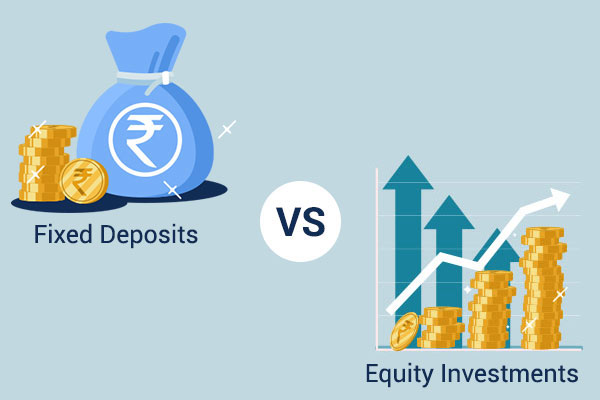Fixed Deposits vs Equity Investments – A Compressive Guide

Fixed deposits are low-risk investments that provide assured returns, while equities are high-risk instruments that can generate high returns in the long run.
Investing your money for better returns is crucial for a worry-free life. With the right kind of investments, you can get financial freedom and security that help accumulate enough wealth for your future monetary needs and goals. There are many investment instruments in the financial market today. An investor can choose the most suitable option based on risk appetite, financial goals, expected returns, amount to be invested, etc.
Fixed Deposits (FD) are the most traditional and popular among the various investment options available. The FD rates are fixed when opening an FD account and remain constant for the life of the FD. An interest FD calculator tells the investor beforehand how much he would earn on his investment.
Another popular option for growing your money is through equity investment. Equity investment means investing in the share market. Equity investments require the investor to have a high-risk appetite and the will and patience to see if funds go up or down in the market. Investors capable of absorbing risk and having the financial backing to absorb a loss can consider investing in equity.
Understanding Equity Investment and Fixed Deposits Before Investing
Before you decide to put your hard-earned money into a financial instrument, it is necessary you understand the details and pros and cons of the instrument in depth. This becomes even more important when you invest in equity. Before investing in the share market, you must familiarize yourself with market-related terminology such as indices, short selling, share price, margin, etc. You need to read a company’s balance sheets and understand its financial position before investing in its shares.
On the other hand, Fixed Deposits are straight investments and require no such knowledge or research. Simply use an interest FD calculator and find out your expected returns at the time of investing.
Unlike equity investments, which are entirely market-dependent, the FD interest rate does not change with the changing stock market conditions.
Difference Between Fixed Deposits and Equity Investments
Feature |
Equity Investment |
Fixed Deposit |
Meaning |
Equity investment means investing in the shares of a company. It gives you ownership of the company to the extent of the value of shares you purchase. |
Fixed Deposits are fixed-return financial instruments offered by banks for a pre-decided tenure. They are a lump sum investment. |
Returns |
Equity investments do not promise guaranteed returns. They depend on the market conditions and economic environment and may be high or low. |
The returns on Fixed Deposits are fixed when opening an FD account and can be calculated using an interest FD calculator. The FD interest rate does not change with changing market conditions. |
Risk |
These are high-risk investments because the returns depend on the market conditions. |
These offer assured returns that are predetermined. |
Profit Potential |
Stock market investments hold a high potential to earn profits. |
The profits are fixed and are dependent on the FD interest rate. |
Liquidity |
Equity investments are highly liquid, and the investor can sell his holdings any time he wants. |
An investor needs to hold his Fixed Deposit till maturity. However, he can liquidate his investment prematurely for a nominal reduction in the FD interest rate. |
Effect of Inflation |
Generally, equity investment offers inflation-beating returns when the investor holds it for the long term. |
The returns on an FD are higher than savings accounts but may or may not beat inflation. |
The Final Word
Equity investment garners better returns in the long run for an investor. However, FDs allow investors to invest a set amount of money for a fixed period of time at a pre-determined interest rate.
Additionally, an investor needs to acquaint himself with the market and follow and study the stock market trend and the financials of various companies to make the right investment decision. Fixed Deposits come with fixed returns and are closely monitored by the Reserve Bank of India. It removes the chances of fraud and scams from FDs, making them a safe investment choice. FDs do not require the investor to gain knowledge about the stock market or prevailing economic conditions. An investor can calculate his returns on an FD using an interest FD calculator.

 Blog
Blog Blog
Blog



Comments
No comments yet.